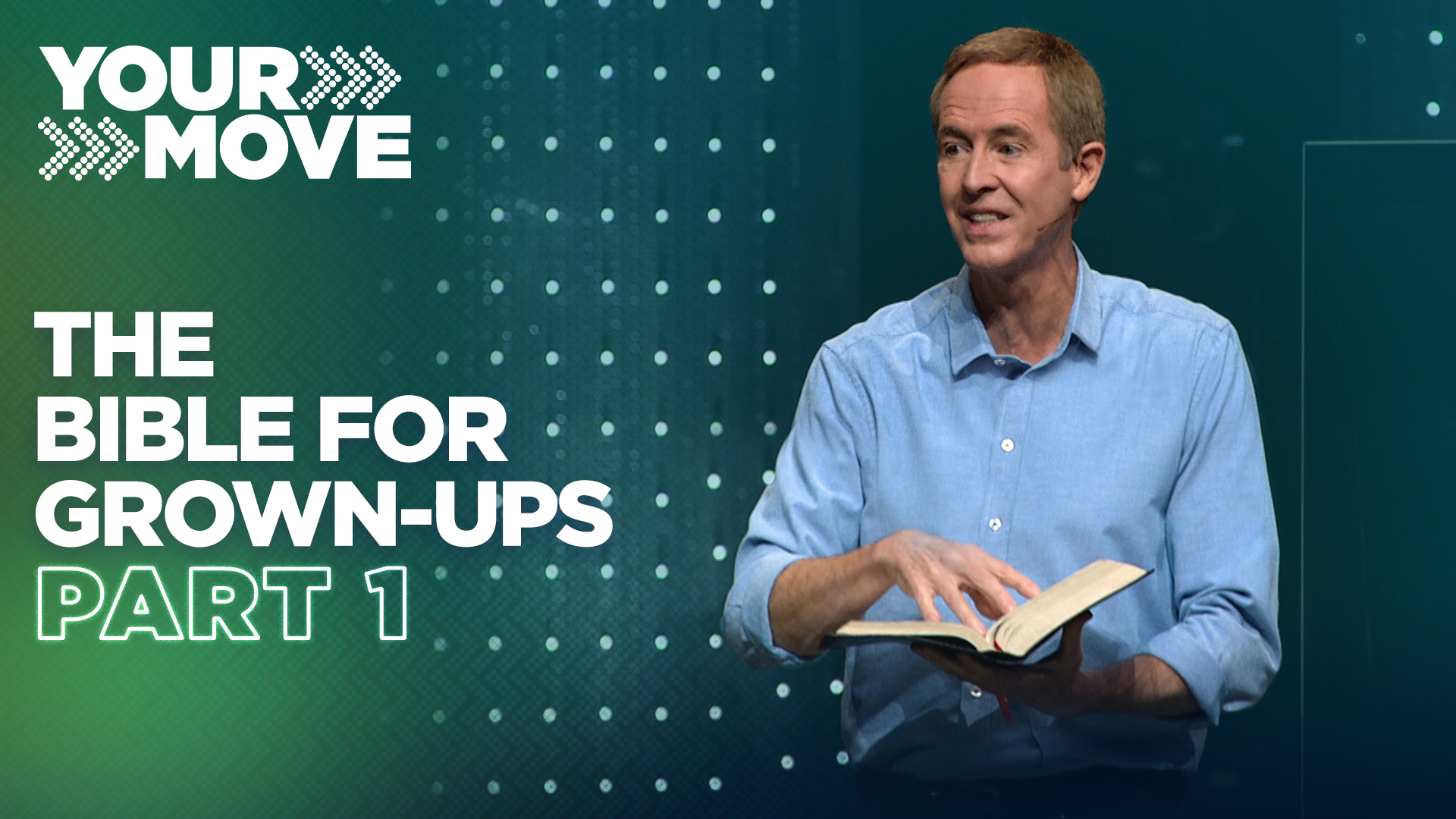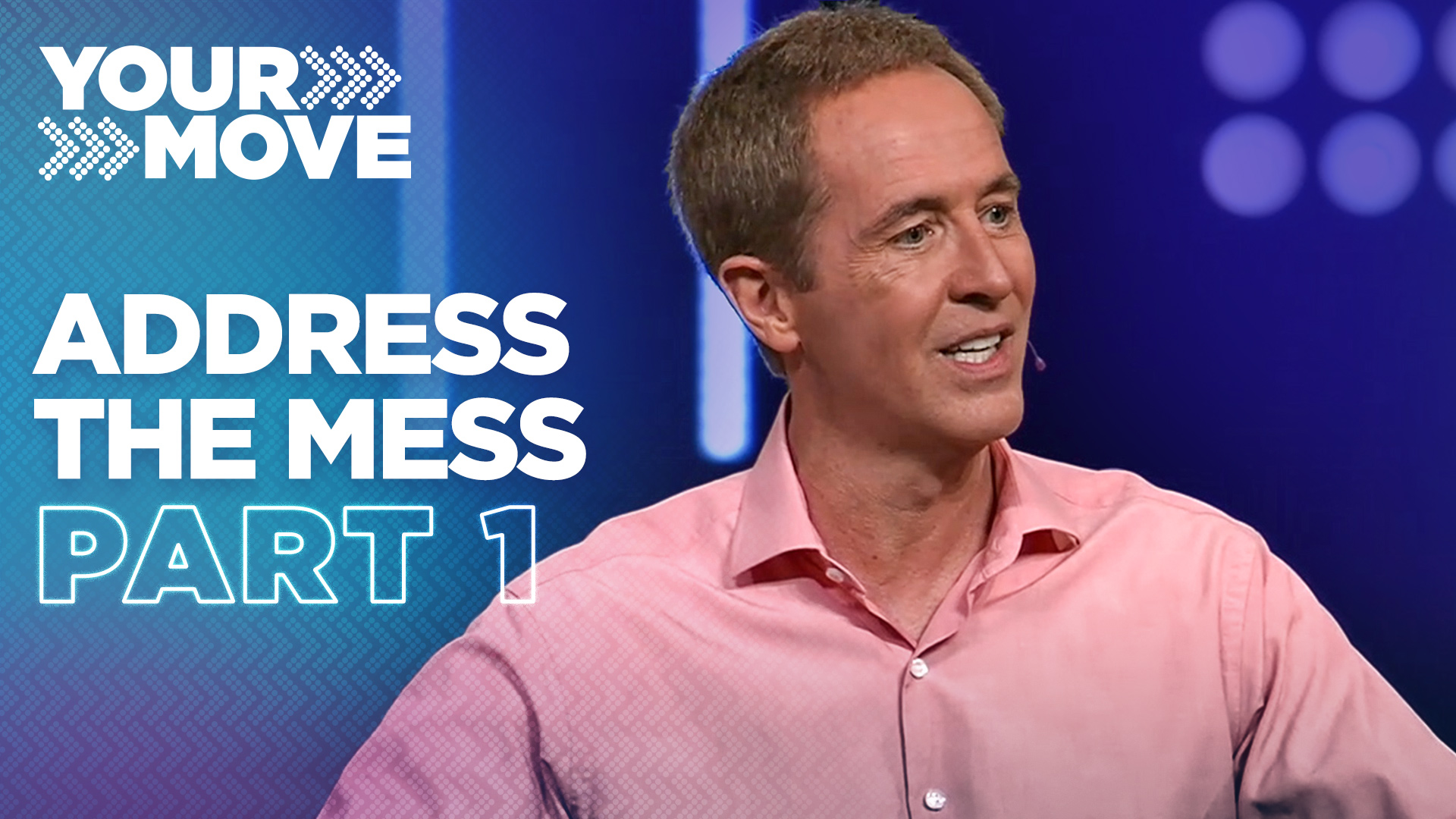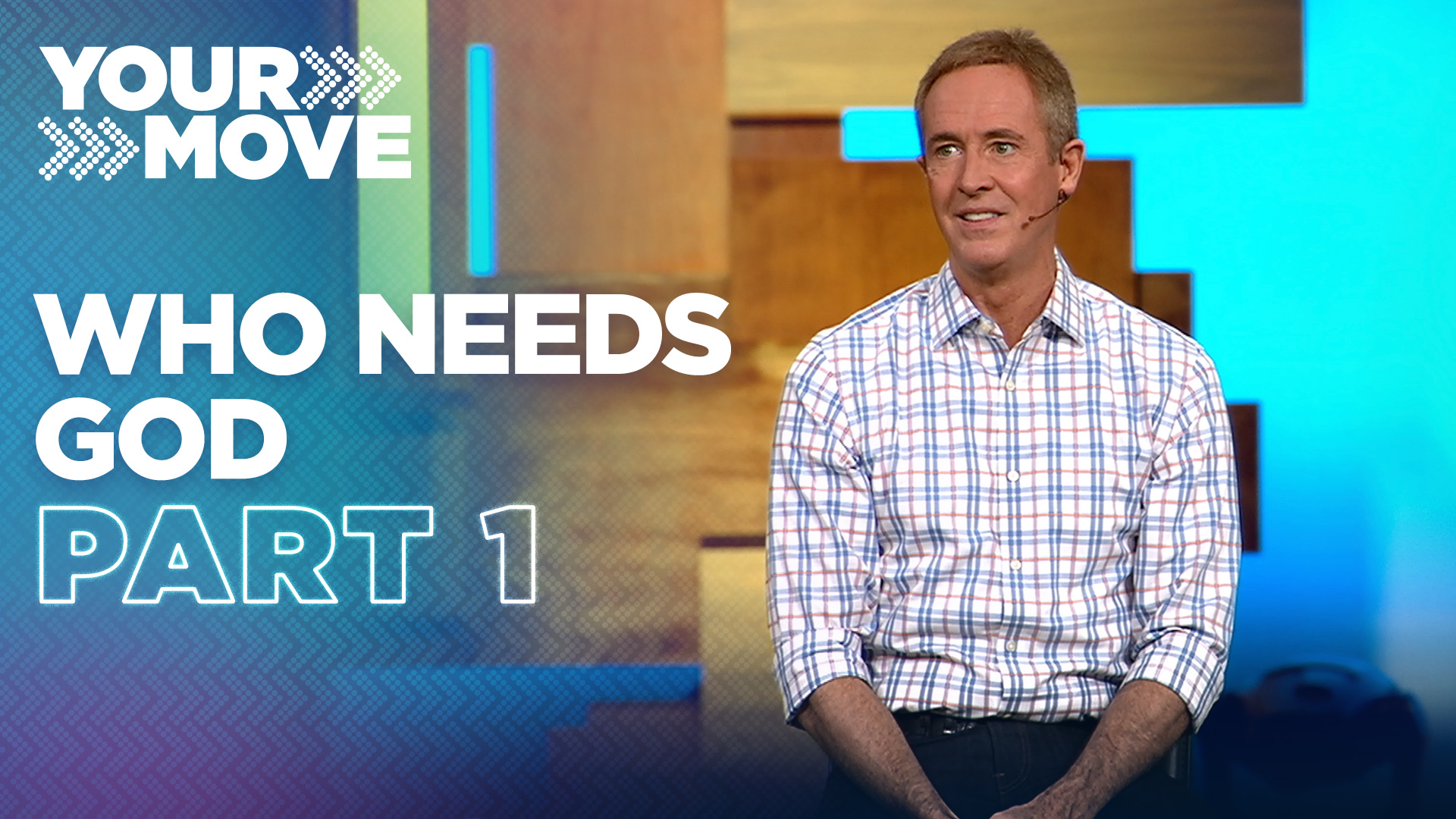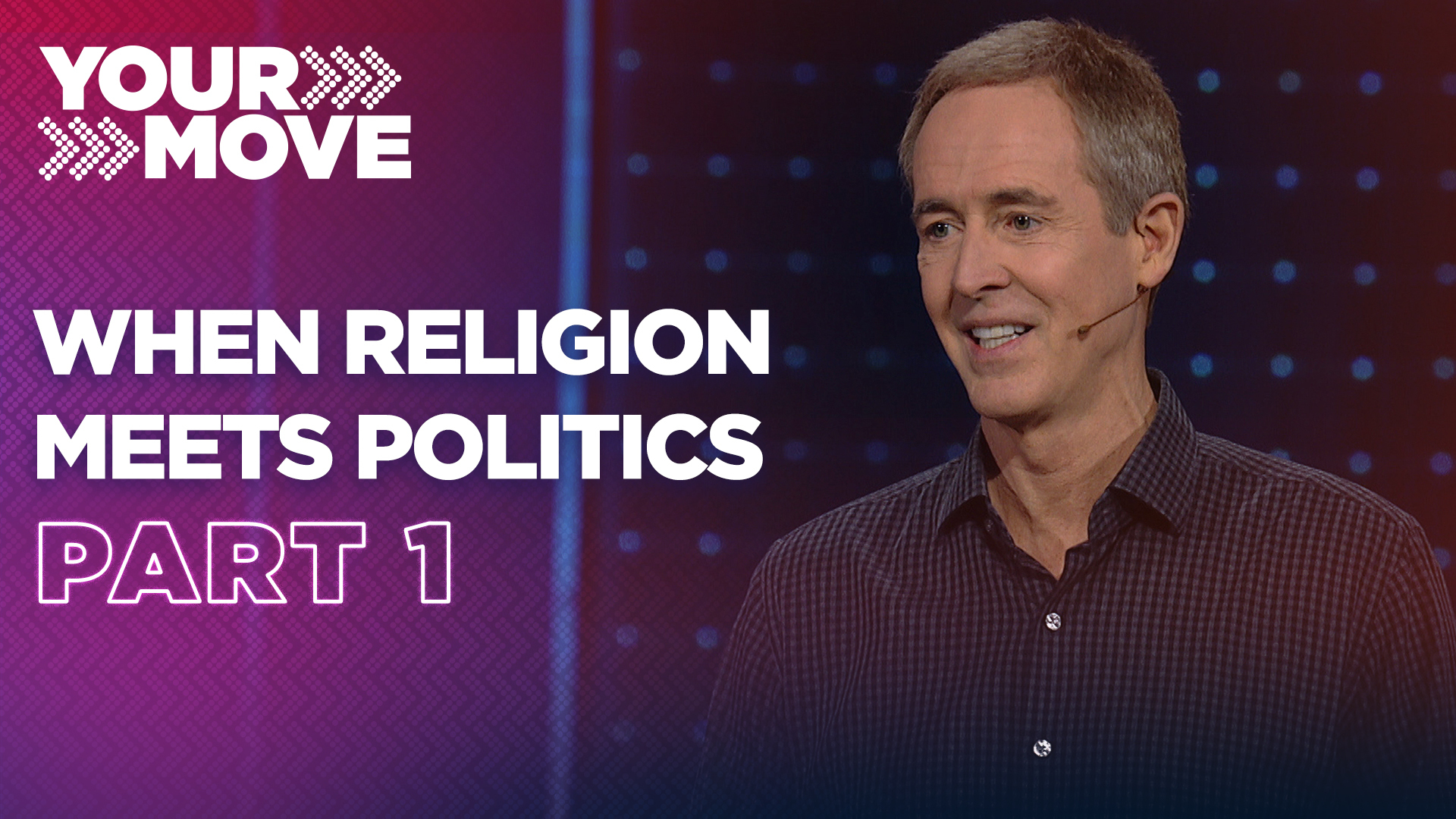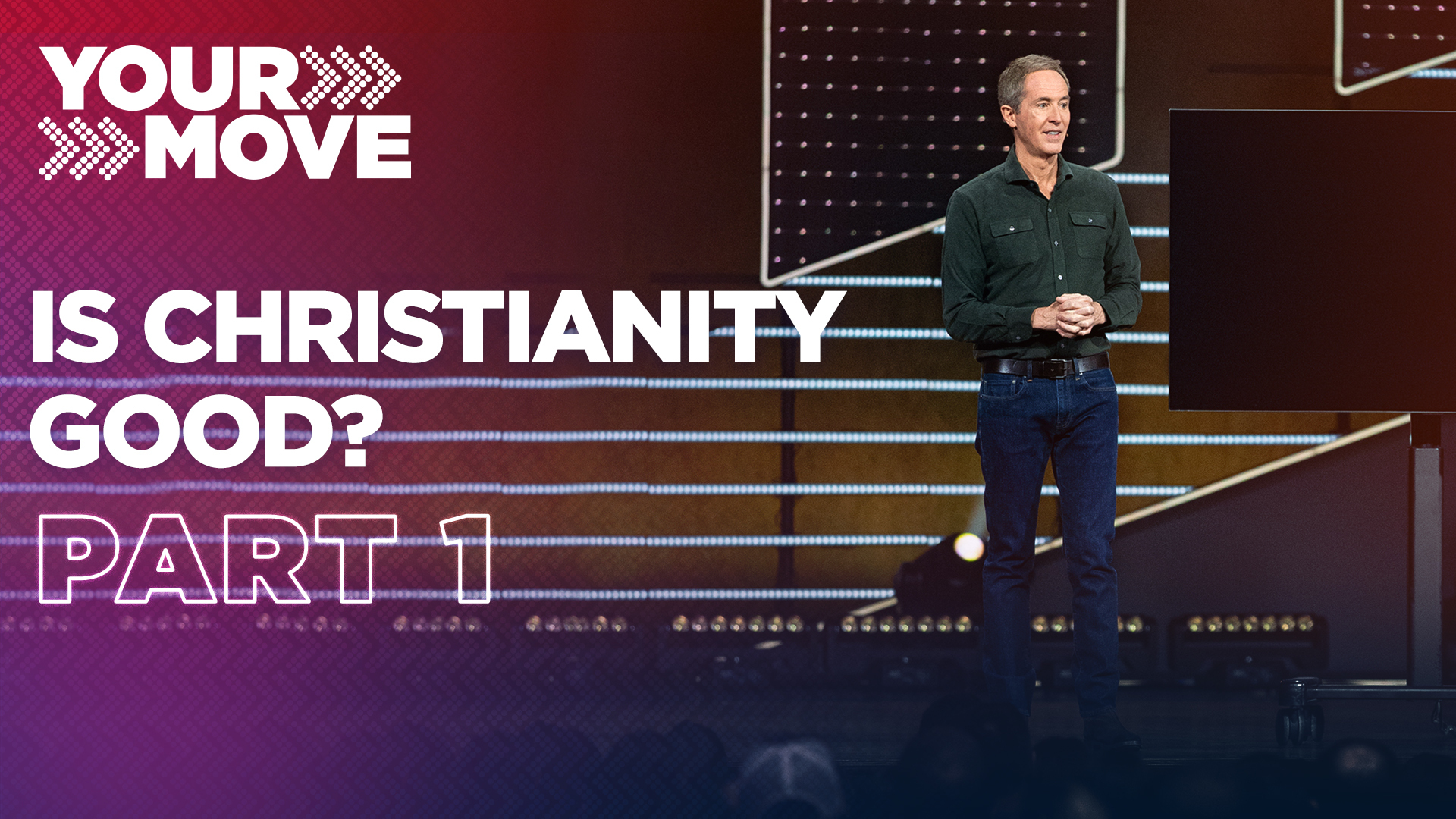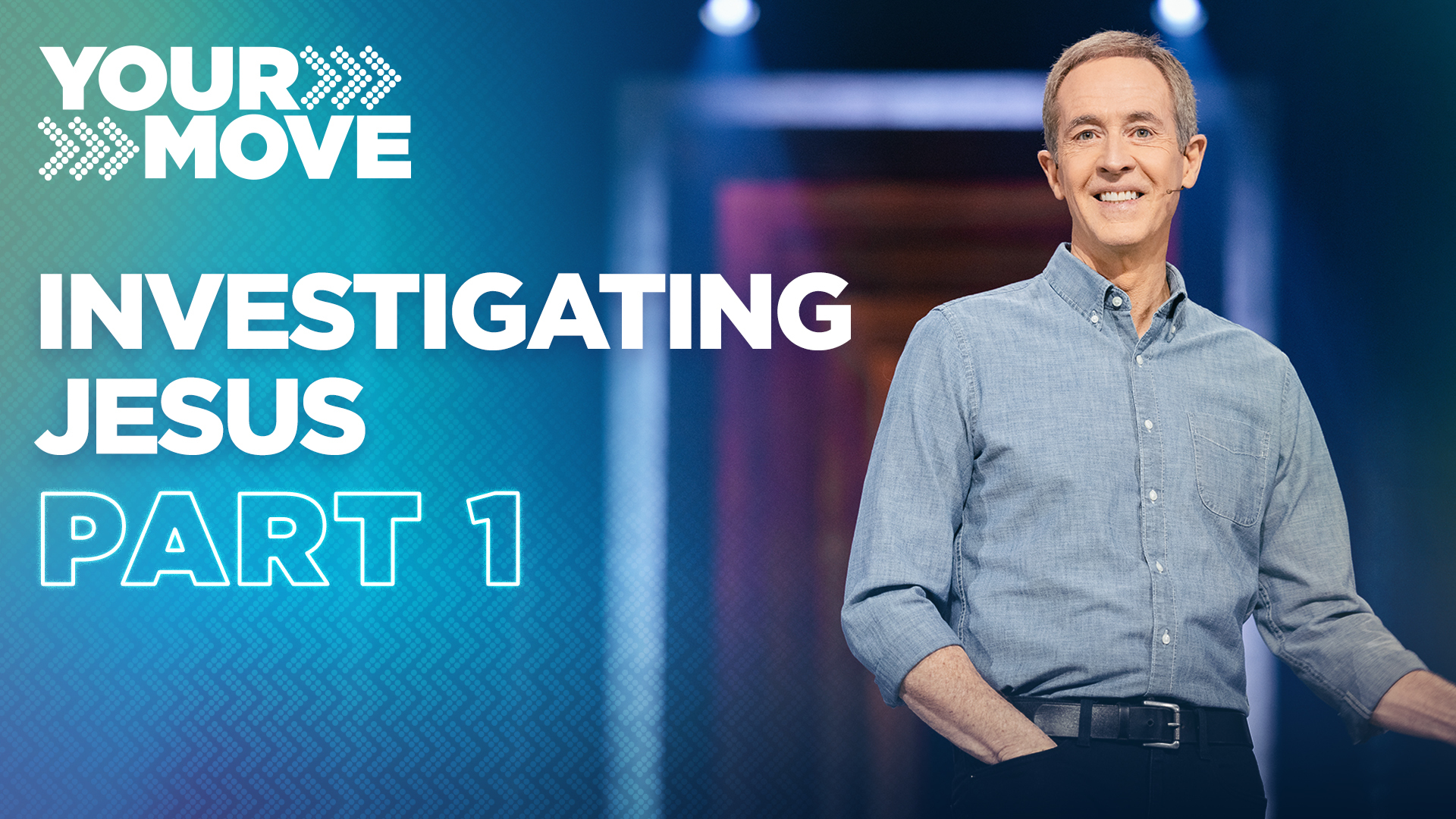The messes in our lives can be, well . . . messy. And if we’re not careful, they can become even messier. So, how do we make choices that lead us forward instead of backward?
- Have you ever made a messy situation messier? How so?
- When you’re in a difficult situation and you’re not sure what to do, how do you typically respond? (Retreat inwards? Reach out for help? Ignore it?)
- Discuss a time you witnessed someone make a difficult—but ultimately better—decision, even when there was an easier way around it.
- What’s the hardest part about “taking the high road” instead of the path of revenge?
- Think about a decision in your life right now. Consider all the possible options. How could asking, “What story do I want to tell?” help you make a decision? Which options could lead to a story you don’t want to tell later on?
NOTE: The following content is a raw transcript and has not been edited for grammar, punctuation, or word usage.
Have you ever made a mess messier? Have you ever made a big mess a bit messier? That is, in trying to clean up the mess, the mess got worse? The mess that I made messier that will forever be a reminder as long as we live in our current home is when our black Lab jumped up on a shelf in our basement, in the unfinished part of our basement fortunately, and knocked down three gallon cans of paint, and two of the lids stayed on and one of them didn’t. And you know how you keep paint around for too long, it’s like finally you throw it away, it’s like there’s something about we can’t throw it away yet, then two years later you finally throw it away.
So it was one of those cans. And it was oil-based paint, so like that thick oozy thing, so it’s yellow. I don’t even remember when we had yellow in our house. And so the lid came off, I heard the crash and went running in there, and she’s panting with yellow paint on her nose. So we got her out of the way. And so the can’s over and it had oozed out to about this big, again because it was just so thick and oozy, and I thought, “Oh good, at least it wasn’t like splattered across the floor.” So the original mess was this big. Then I started cleaning it up, and it’s about 10 feet of the floor by the time I realize you don’t wipe it. It just went on and on and on. So now if you ever visit our home and go down to the unfinished part of our basement, it looks like the entire gallon spilled out because I made a mess messier. And that’s kind of funny and you probably have your own story.
1:37
But when you make a financial mess messier, you make a marriage mess messier, you make a dating relationship mess messier, you make your morality mess messier, you make a professional mess messier, an academic mess messier, it goes on and on and on. When you make a mess messier, it just gets messier, right? And here’s the reason we make messes messier. This is what we’re gonna talk about today. In fact, if you’re not a church person, religious person, Christian person, this is true for all of us, so heads up. Every mess that you make, and every mess that you’re involved in whether you marry into a mess, you dated your way into a mess, you inherited a mess, every mess, every mess comes with some bad options.
Every mess comes with some bad options. Borrow more, lie bigger, destroy the evidence, hide, make up a story, send another text and make it sound like the first text really wasn’t meant for them after… There are always some really bad options that come with every mess. And these bad options essentially just make the mess messy-er. So for the next few minutes, I wanna talk to you about “er” because I wanna save you from “er,” alright? Because some messes are unavoidable. And if you’re in the middle of a mess, there’s no way to go back and unmake the mess. But with the mess you’re currently facing whether it’s relational, financial, academic, professional, whatever it might be, there are some really bad options that come with that mess and you are being tempted like we are all tempted to opt for something that’s going to make your mess messier.
And to talk about how to avoid making a mess messier, I wanna tell you one of my favorite stories from the Old Testament. If you have a Bible and wanna follow along, this is in 1 Samuel Chapter 24. Many of you, if you grew up in church, you’re familiar with this story and your mind may race to the end, but hopefully you can just track with us through this story. It is a story that takes place in about 1000 BC. It’s the story of David before he becomes the king, and the story actually begins when David was a little boy because as you may know, one day the prophet Samuel showed up at his home and told his dad, “Hey, I’m gonna anoint one of your sons as king.” And it turned out it was David.
3:46
And so David was anointed the King of Israel when he was a little boy. But the problem was… He was a little shepherd boy. The problem was Israel already had a what? A king, that’s right. Israel already had a king. So now, they had two kings. They had the grown-up adult king, King Saul, and they had the little shepherd boy, David, who went back to tending his sheep. Well, as time went by, David made himself known in the community. One day, he went—as you know, possibly—he went and visited his brothers who were serving in the army, Israel’s army, and he saw Goliath in the valley and he thought to himself, “There’s not much difference between that giant and a bear, and a lion that I’ve killed.” And so David killed Goliath.
And when David killed Goliath, he became an overnight sensation. Everybody knew David’s name because he had killed Goliath in front of the entire army and everybody was talking about David and not many people were talking about King Saul. In fact, Samuel, who wrote this story for us, says this. He says, “In everything he did,” talking about David, “he had great success.” And when Saul, King Saul, saw how successful he was, he was afraid of David. But all Israel and Judah loved David because he led them in their campaigns. And there’s an interesting idea here. The people who lead are perceived as the leaders whether they have the title or not. King Saul had the title “King” but David was the one that stepped out and led. And because he led, people began to perceive David as the leader of the army and perhaps the leader of the nation, and perhaps it’s true, “This is our next king.”
So Saul realizes he has a problem on his hands, and so he comes up with a way to try to control David to keep things from getting any worse. So he decides he’s gonna marry one of his daughters off to David. Because if he can make David his son-in-law, perhaps he’ll be able to control him that way. So he goes to David and says, “David, I would love for you to marry into my family, and I’ll be your father-in-law.” And David responds like this, he says, “Oh, King Saul, what an honor, but I’m a lowly shepherd boy from a family that’s not very important. I’m not worthy of the honor to marry one of your daughters.” Well, word of this gets out. And next thing you know, it’s Maximus the Merciful. No, it’s David the Humble, David the Humble! Can you believe? David was so humble that he gave up the opportunity to be a part of the king’s family?
Well, things continued to go. David gets more and more popular. Saul is more and more jealous. And then, one of Saul’s daughters fell in love with David. So he thought, I’ll try this again. And apparently, David had it for this daughter as well because when he goes to David this time and says, “Would you marry my daughter?” David says, “Yes, I’ll marry your daughter.” And Saul says, “Ah ha. Well, the bride price for my daughter, the bride price for my daughter is not an amount of money, it’s not herds, it’s not sheep, it’s not oxen. The bride price for my daughter is 100 dead Philistines. You have to kill 100 Philistines in order to marry my daughter.”
For Saul said to himself, “I will not raise a hand against him, let the Philistines do that. It’s perfect. There’s no way in the world him and his band of merry men are gonna kill 100 Philistines and bring back the bloody evidence that they in fact did this.” Well, David and his men went out and they killed 200 Philistines and brought back the evidence. Well, this made things even worse for Saul. In fact, Samuel tells us, “When Saul realized the Lord was with David, and that his daughter Michal actually loved David, which meant Saul was not gonna be able to manipulate his daughter to control David, Saul became even still more afraid of David, and he remained his enemy for the rest of his days.”
7:33
Now, here’s the connection between all of that and Address The Mess. David has a big mess on his hands. And here’s the unique thing, and here’s why it’s so relevant to us. David has a big mess on his hands, and it’s not his fault. It’s not like the messes I make, and the messes you make sometimes, right? He didn’t ask to be king. The whole Goliath thing, he was just serving his country. The whole “lead out in the campaign” things… he’s just trying to do what people ask him to do. He refused the king’s daughter’s hand. But no matter what he does, things get worse, and worse, and worse and the mess gets worse, and worse, and worse.
And finally, things escalate to where one afternoon, Saul completely loses it. And he picks up a spear or javelin and he tries to murder David in the palace. And David leaves the palace, runs for his life, heads out into the desert. And from that point on, Saul had it in for David and wanted to kill David. He was jealous. He wanted his son, Jonathan, to be the next king. And as long as David was alive, he was a threat to the king, he was a threat to the kingdom, and he was a threat to the dynasty that King Saul wanted to leave for his family.
When David leaves the city, and when David goes out into the wilderness basically to hide, he gathers around him all of Saul’s enemies. Saul had many, many, many political enemies. And now David is an outlaw. And he gathers around him literally a band of merry men and some merry women and before long everywhere he goes there’s a village following him around. But he’s an outlaw, but Saul has not lost his desire to kill David. The story gets really interesting. Okay, so here’s where the story picks up.
After Saul returned from pursuing the Philistines, he was told David is in the Desert of En Gedi.
So Saul took 3,000 able young men from all Israel and set out to look for David and his men near the crags of the wild goats, which was a large spring, looked something like this. In fact, if you’ve ever been to the Dead Sea, or you’ve ever been to Jericho, if you’ve ever been to the Holy Land, you’ve been to the area of the Desert of En Gedi. And it looks like this everywhere. There’s the Dead Sea. It is just rocks, and hills, and mountains, and caves with some shrub grass and every once in a while you’ll find a spring. So apparently, David and his men are at this spring. Saul knows, and he says, he’s decided this is his opportunity to take care of David. The story continues, “He came,” talking about Saul, “Saul and his men came to the sheep pens along the way, and a cave was there, and Saul went into the cave to relieve himself.” This is one of the only references in the Bible to going to the bathroom.
10:17
David and his men were far back in the cave. They’re in the very cave. Apparently, here’s what happened. When Saul began to come up behind David and his men, one of David’s scouts came and warned David and said, “David, Saul has discovered us. We need to do something.” And David said, “Instead of outrunning them, let’s split up. We’ll hide in the caves, we’ll hide in these mountains, and when Saul and his group has passed through, we will reassemble and we will go the other way.” So David and his closest men are hiding in the very cave that Saul chooses to go into to use the bathroom.
Now, here’s the question, what are the odds of this? If ever God has performed a miracle on David’s behalf, this is the miracle that God has performed on David’s behalf. If Saul is a stain, God just provided the stain remover. If Saul is the problem, God just provided the solution. What could be any clearer than this? In fact, the men hiding with David back in the cave, they saw this for exactly what they thought it was. God has delivered your enemy into your hands.
Here’s what they said. The men with David said, “This is the day the Lord spoke of when He said to you, ‘I will give your enemy into your hands for you to deal with as you wish.’” And what they’re referring to is this, as David and his men traveled around, they would gather around a campfire at night, and they were tired, they were outlaws, they were poor, they didn’t have a place to lay their head, they left their family in different cities around Judea, it was a dangerous lifestyle. And David would say, “Just be patient. Stick with me. Be patient, stick with me. One day, I’ll be king. And if you stick with me until then, when I’m the king, I will reward you because someday God is gonna honor his promise to me and I will be king.”
And so the men around David are saying, “Are you kidding me? This is the day that you spoke of. This is the day that you promised. This is the day we’ve all waited for, and look how God has clearly delivered your enemy into your hands, and imagine what this is gonna be like, David. All of those men out there saw Saul walk into the cave, and then they will watch David emerge. Can you imagine the drama? And David, it would be even better if when you emerge from the cave, you held up Saul’s severed head? In that moment, they will pledge their lives to you, in that moment, it will be an almost bloodless coup and you will be king.” Can you imagine the drama of that moment as the men wait out there for Saul to return?
12:47
Well, David gets caught up in the emotion of this, right? Again, how could you not be? You’ve been a fugitive, you’ve been on the run, and now here is your enemy by himself in the most vulnerable position imaginable. What could be more of a God thing? And so David gets caught up in the emotion and David decides to do unto him as he intended to do unto me. “I’ll just do unto him as he intends to do unto me. No one would blame me. No one would say that I’d done something unjust. It’s an act of self-defense. I’m just gonna do unto him as he intends to do unto me.”
Now, pause the story for just a minute. At the root of most of our messes or associated with most our messes, the ones we married into, the ones that we created ourselves, the ones we dated our way into, accidentally got ourselves into, at the root of most messes is a breakdown of virtue. Virtue is integrity. Virtue is honesty. Virtue is patience. Virtue is self-control. Virtue is goodness. And when you scratch beneath the surface of any of the messes that we’ve made, somewhere in that mess we demonstrated a lack of virtue. There was a breakdown of virtue. In other words, if you ignore virtue, if you ignore virtue, you will eventually make a mess.
You ignore virtue and eventually you make a mess. It’s just a matter of time. It is cause and effect. It’s just an equation. You ignore virtue in a relationship, you ignore virtue in your finances, you ignore virtue in your profession, academically… eventually you’re going to make a mess. And you don’t clean up a failure of virtue with another failure in virtue. You don’t clean up a flood with more water. You don’t clean up a paint spill with more paint. You don’t clean up a soap spill with more soap. Two wrongs don’t make a right and two messes don’t make an un-mess. You can’t clean up a mess caused by failure of virtue with another failure of virtue. But here’s the problem. Every mess comes with some bad options and those bad options always involve a failure of virtue. And they are the options we are tempted to reach for quick because it looks like I can quickly turn this thing around.
Somehow, I’m gonna make this better. Somehow, I’m going to fix this. I’ll just borrow more money. I’ll just lie. I’ll just cover the evidence. I’ll just ask a friend to vouch for me so that nobody knows where I really was. With every mess, there are options that reflect another failure of virtue. You do not clean up a mess that was created with a failure of virtue by adding another failure in virtue, which was exactly what David was about to do. In fact, the text tells us that David crept up unnoticed. David was a warrior. David was a soldier. This was his sweet spot. This was in his wheelhouse. He would be able to creep up behind King Saul, with King Saul never knowing what happened. All he would feel would be a yank on the back of his hair and that would be the last breath he would take.
16:01
And as he’s creeping up on King Saul, something dawns on him, “I am about to make my mess, messier. I am about to murder the king. What in the world am I thinking? And if I murder the king, if I murder the king, this will be my story forever.” Now, this is where we get trapped. Was that justified? Would he have been justified in killing the king? Well, everybody would say, “Yes, absolutely. He’s trying to kill you.” Is it what everybody expected him to do, including his friends in the cave? Absolutely. Was it the right thing? Was it the virtuous thing? Absolutely not.
And he was about to add to his story a part of his story that he would be embarrassed to tell for the rest of his life. “Granddaddy, tell us again how you became king.” “Well, your great-grandfather was taking a… ” Whatever they called that in 1000 BC. “You see, David was about to make a decision that he would regret for the rest of his life even though it was justified, even though it’s what everybody else expected, even though it’s what, arguably, Saul deserved.
And there we are, and that’s our tension. And that’s our dilemma because every mess comes with some really bad options. Then David crept up unnoticed, but instead of killing Saul, he cuts off a corner of Saul’s robe. Attacking anything a king owned was like attacking the king himself.
Afterwards, David was conscience-stricken for having cut off a corner of his robe and he said to his men, he said to his men, “The Lord forbid that I should do such a thing to my master.” What? “The Lord’s anointed. Or lay my hand on him for he is the anointed of the Lord. Hey, guys, I almost forgot, God put him in place and I have no business replacing what God put in place. It is not my responsibility to replace what God put in place and I don’t wanna become king by murdering the king.” Well, when he said this, the men around him said, “Well, you may feel bad about it. We don’t feel bad about it. Let us do it. You don’t want his blood on your hands. We would love to have his blood on our hands. We will do what you are unwilling to do.” But with these words, with these words, David sharply rebuked his men and did not allow them to attack Saul, and Saul left the cave and went his way.
18:42
Now if you think it’s been a good story so far, you think it’s been dramatic so far, what happens next is unreal. Somebody needs to make a movie around it just to get to this scene. It is so extraordinarily powerful. So let’s back up. So you were sitting out, we’re sitting on our donkeys and our mules and our horses and the hot… And oh my gosh, is it hot? The hot, hot sun right down there in the Dead Sea valley, in that basin. Waiting, waiting, waiting. Finally, finally, here comes Saul, are you done yet? Nobody makes eye contact. Everybody pretends like we don’t know why we stopped here. Here comes Saul. He’s got his robe on, making his way down, down, down. Somebody comes and gives him two hands, he steps up, gets on his mule. And they’re about to leave and David appears in the mouth of the cave and says, “Yoo-hoo, yoo-hoo.” And everybody…
I don’t know if he did that or not. Everybody turns. Because the text tells us, “Then David went out of the cave and called out to Saul.” And everybody looks and Saul turns and he squints and he says to his young companion. He says, “Is that who I think it is?” And he says, “Yes, your Highness. It is your son-in-law, David.” And everybody in Saul’s army knew immediately what had just not happened. Can you imagine this? Here’s what Samuel says happened next. David gives a little speech, here’s a piece of the speech. “This day, you have seen with your own eyes how the Lord delivered you into my hands. God brought you. God delivered you up into my hands, in the cave. Some urged me to kill you, but I spared you. Not only did I not kill you, I kept other men. I defended you. Saul, I just did for you what your bodyguards standing around you now failed to do. Shame on your bodyguard. I have protected your life in a way that they failed to do.”
This is unbelievable. “I said to them, I said, I will not lay my hand on my Lord, because he is the Lord’s anointed. You may not be acting like the Lord’s anointed, you may be a sorry example of the Lord’s anointed, but you are the Lord’s anointed, and I’m not gonna replace what God put in place.” And then he says something that some of you listening and some of you watching and some of you in the room, you need to just lock and load on this. This is so, so, so, so important. David says, “May the Lord judge between you and me, and may the Lord avenge the wrongs you have done to me, because you have wronged me, there’s no mistake about that. But my hand will not touch you.”
21:27
Oh my gosh, I mean David’s reputation in the community, if it could have… How could it get any higher? Now it is David the Merciful, David the Merciful, David the Merciful. Essentially, what David said to Saul and the soldiers, essentially what he communicated to them was simply this, “I’m opting for virtue over hurt you. I’ve taken the high road in a way that no one could even imagine. I’ve acted in such a way that puts me almost in a category of one.”
Well, what can Saul do? He’s completely humiliated. His bodyguard is completely humiliated. His soldiers are in awe of David. Saul knows at any minute they may just declare David king, because they’ve never seen anything like this. This is completely unheard of in a world of bloodshed, where death came easy and life was cheap. So Saul says back to David essentially, “Today, it’s evident to all of us that you are a better man than me.” And Saul turns around and heads back to Jerusalem. And seven chapters later, seven chapters later, a random Philistine arrow pierces Saul’s armor and he dies, and David becomes the king of Israel. This is what I wanna make sure you don’t miss today. Every mess, every mess, every mess comes with a pre-packaged list of bad options. Every mess comes pre-packaged with some bad options. Every mess comes pre-packaged with some bad options, and if you choose a bad option, you will make your mess messier.
The real story, the real story, is your response to the mess. That’s the real story. And your response to the mess, your response to the mess becomes a permanent part of the story of your life. Your response to the mess, not just the mess. Your response to the mess becomes a permanent part of the story of your life. Which brings us to the question I beg you to ask. And somehow between his friends and King Saul, it dawned on David, what story do I want to tell? What story do I want to tell?
When people hear that you went through a divorce four years ago, what story do you wanna tell coming out of that divorce? When people discover that you had to declare bankruptcy three years ago, or you’re in the midst of it right now, what is the story you wanna tell as a result of the options you chose coming out of bankruptcy? Sure, you dropped out of school or you failed out of school, but the question is, what is the story? What did you do as a result? Which option did you opt for? Yeah, you got caught, yeah you got busted, but what was your response? Because your response to your mess is, that’s what it becomes, the story, the permanent part, the permanent, the permanent extension, the story of your life. So, let me ask you this way. Which of the options do you want as a permanent part of your story? And I can answer that question for you. You know what the answer is?
24:41
The virtuous option. I faced up to her and I told her the truth. I turned myself in. I asked them exactly what I owed them, and I told them if it took the rest of my life I would pay it off. We cut up our credit cards, that was the end of that. I went to the dean and I apologized and I told the dean I would do anything I needed to do if he would let me or if she would let me back into school, and I studied harder than I’ve ever studied before. Which of your options do you want as a permanent part of your record, your story? That’s the story. Because the real story isn’t that you’re a mess. Everybody has a mess. It’s what we do. It’s how we address the mess. It’s how we respond. And I guess part of my energy today is I just don’t want any of you to add more water to your flood. I don’t want any of you to add more paint to your paint spill. I just don’t want any of you to make it worse. So look up here. So, don’t choose an option that makes you a liar for life.
So, after the bankruptcy, what did you do? Made-up story, made-up story, made-up story. So, when your wife confronted you and you were busted and everybody knew that you were guilty, what did you do? Made-up story. Don’t opt for anything that makes you a liar for life, and don’t opt for anything that makes you a hypocrite for life.
Now, I understand when it comes to finding ourselves in a mess, we all want a quick fix. Right? One lie and I’m good. One more loan and I’m golden. One more, one more, we all want a quick fix.
And, we all want an eye for an eye. If you treated me poorly, hey game on. I can poke out more eyes than you can poke out. We’ll just keep poking out eyes until everybody’s blind, okay. I can go eye for an eye with you. Of course, we want that. That’s in us to want that. Think about this. Think of the story you have the opportunity to tell. “David, how did you become the king?” “I did what no one would do. I did what no one expected me to do. I didn’t do what I could get by with. I opted for virtue over expediency.”
27:10
Because your mess will simply be the context for the real story. The story of your life. What story do you wanna tell? Which of your options, think about it, which of your options do you want as a permanent part of your story? And if you will embrace this idea, and if you will ask those questions, that’s the way to address a mess.



